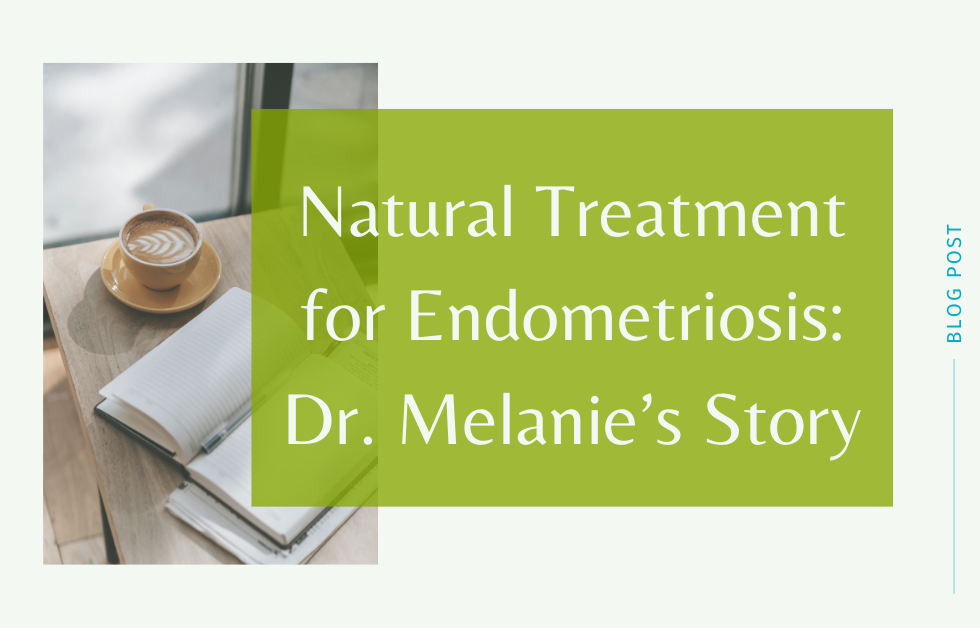Endometriosis is a painful condition that effects 1 in 10 women. Natural treatments for endometriosis aim to treat the underlying cause. Many women suffer from endometriosis on a physical and emotional level, and may feel that long-term relief is hopeless.
Natural treatments for endometriosis, including diet and supplementation, have worked for many women, including Dr. Melanie who suffered with endometriosis and other medical issues until she found a naturopathic doctor to give her a new life without chronic pain.
Dr. Melanie’s Story
I had always dealt with painful periods. I thought this was the norm. In my late 20’s the pelvic pain increased and became constant. At first, I was diagnosed with yeast infections even though cultures came back negative. Then I was told I had fibromyalgia and I was told it was “all in my head”. The numerous pelvic exams and pelvic ultrasounds left me on the couch in pain for days.
I then talked to a friend who had serious problems with endometriosis and she gave me the name of her doctor who was an endocrinologist. He said my symptoms fit with endometriosis and the only way to diagnose was to do laparoscopic surgery as endometriosis does not show up on an ultrasound. It turns out that I did have it, and he was able to remove cysts and cauterize my lesions during the laparoscopic surgery. He then put me on birth control pills and said that should keep it under control.
At this time of my life I was working as an engineer and didn’t understand that cauterizing the lesions and being on birth control pills was not addressing the underlying cause of the imbalances in my body.
In my early 30’s I had issues again and I was put on a medication called Lupron, which was supposed to help by putting your body into early menopause by blocking estrogen. The side effects were horrendous and I could only do 3 out of the recommended 6 injections. Once again, I had the laparoscopic surgery, was told to stay on birth control pills and was given pain pill prescriptions. It was recommended several times that I have a hysterectomy.
Over the course of the next few years, I began developing other health issues and was put on additional medications. At the age of 35 I was on 10 different medications for various reasons. I had no energy, was very depressed, had recurrent respiratory infections, developed migraines that lasted for 3 days, was sick to my stomach most of the time, and in pain. I was barely functioning and felt like I had hit “rock bottom”.
The only good thing about hitting “rock bottom” is that it gave me the motivation to find another way as I felt I had nothing to lose. It was at this point I sought help from a naturopathic doctor. He not only helped me regain my health but gave me my life back. After this experience I knew I had to help others and went back to school for my doctorate in naturopathy.
At the age of 35 I was on 10 different medications for various reasons. I had no energy, was very depressed, had recurrent respiratory infections, developed migraines that lasted for 3 days, was sick to my stomach most of the time, and in pain.
A large part of my journey back to health included what is discussed in this blog, but also some of this information is newer research.
It is my hope in writing this blog that it will help others who are suffering with endometriosis that affects women not only physically but also emotionally.
Endometriosis: What It is, What Happens
Endometriosis is a condition where the lining of the uterus grows outside of the uterus creating lesions and sometimes adhesions to other organs. This painful condition affects 1 in 10 women.
Endometriosis is an inflammatory disease. Most commonly, endometrial lesions are found on the ovaries, fallopian tubes, tissues that hold the uterus in place and the outer surface of the uterus. 1
Pain is the most common symptom and may include:
-
- Painful menstrual cramps
- Chronic pain in the lower back and pelvis
- Deep pain during or after sex
- Intestinal pain
- Painful bowel movements or pain when urinating during menstrual periods.
Other symptoms may include bleeding or spotting between periods, infertility, or digestive problems. 1

Endometriosis Causes
It seems that certain women are more susceptible to endometriosis because of factors which may include genetics, epigenetics and toxin exposure before birth. These factors may lead to certain areas of dysfunction in the body that triggers endometriosis. Women need to know that they are not at fault.
By supporting the microbiome, immune system, and hormones, we bring the body back into balance and offer relief. The areas of dysfunction include:
1. Circulating endotoxin, LPS, due to Leaky Gut:
Gut dysbiosis (an imbalance in bacteria in the gut) can lead to leaky gut. Certain genetic or environmental factors may affect this bacteria balance or the microbiome. LPS (Lipopolysaccharides), an endotoxin, is the major component of the outer membrane of Gram-negative bacteria (such as E coli) and serves as a physical barrier that protects bacteria from its surroundings.
Normally housed safely in the gut, LPS has been found in the pelvic area in women with endometriosis due to leaky gut. 2 Once LPS is circulating it causes inflammation, disrupts the microbiome and triggers an immune response. Endometriosis may improve after antibiotics temporarily due to circulating LPS.
2. Immune Dysfunction:
LPS triggers an immune system response by inducing macrophages to release inflammatory mediators. A macrophage is a large white blood cell that has the ability to locate and ‘eat’ particles, such as bacteria, viruses, fungi, and parasites. The macrophages release more pro inflammatory cytokines (or signaling molecules) in the presence of gram negative bacteria which promotes growth of new blood vessels (angiogenesis) thus facilitating endometrial growth.
Both parts of the immune system, innate and adaptive, are not able to keep things in order with endometriosis. (The innate immune system is our immune system we are born with and the adaptive is our acquired immunity.) Women with endometriosis seem to have lower protective NK (natural killer) cells even in the presence of lots of macrophages indicating an innate immune system dysfunction. The lower NK cells may be why the innate immune system is not removing the lesions.
The adaptive (or acquired) immune system includes Treg (regulatory T lymphocyte cells). As the name suggests these cells have a role in regulating or suppressing other cells in the immune system. Tregs control the immune response to self and foreign particles (antigens) and help prevent autoimmune disease. Women with endometriosis have a higher number of these cells indicating that the adaptive immune system is responding but is not able to keep things in order. 3
3. Estrogen Dysfunction:
Estradiol is strongly stimulatory to endometriosis. Estrogen should suppress an over active immune system but does not in this case. Conventional medicine treatment uses birth control pills and Lupron to block estrogen. Unlike other female issues like PCOS and PMS, endometriosis is an inflammatory disease similar to an inflammatory bowel disease. Blocking hormones does not lower inflammation.
Unlike other female issues like PCOS and PMS, endometriosis is an inflammatory disease similar to an inflammatory bowel disease. Blocking hormones does not lower inflammation.
Naturopathic View of Endometriosis
Natural treatments start with treating leaky gut, supporting the immune system, and balancing hormones. Everything is connected. When we start by supporting the microbiome and treating the leaky gut, we modulate the immune system because a large percentage of our immunity is in the gut. 4 Balanced hormones equals balanced immunity because hormones play a significant role in our immunity.
Naturopathic Treatment of Endometriosis
Mainstream medical treatment of endometriosis includes laparoscopic surgery to remove the lesions, birth control pills to control hormones, and at times Lupron to block estrogen. However, since endometriosis is an inflammatory disease, mainstream treatments do not address the underlying cause.
A naturopathic doctor treats the underlying cause of disease. Lowering inflammation through diet is an important piece in treating endometriosis.
- The first step is to remove inflammatory foods such as gluten and cow’s dairy (A1 casein). Both of these proteins can release an inflammatory immune response. A sign that can come with a sensitivity to A1 casein is upper respiratory issues and ear infections as a child. They may outgrow this but immune system still responds to it. Goat and sheep dairy at times can cause less of a response in people because they contain A2 casein instead of A1 casein.
- If there’s no relief with removing cow’s dairy and gluten, then a Candida Free (yeast free) diet is the second step. High yeast foods would include dairy, sugar, breads, and fermented foods including alcohol. This is a low inflammatory diet and helps balance the microbiome. Typically this diet by default removes dairy, gluten, and processed foods. A Candida Free diet can be of benefit especially to someone who has been on birth control pills as they can feed yeast overgrowth (candida).
- An appropriate probiotic is also recommended. This coupled with diet can help rid the body of unwanted bacteria, fungi, and viruses. With endometriosis there is a disruption of the pelvic microbiome which is more than likely the contamination of gram negative bacteria due to leaky gut.
- Balancing hormones can help with the stimulatory affects that estrogen has on endometriosis. An excess of estrogen or a deficiency in progesterone can cause more pain. GNRH antagonists such as Lupron that are used to block estrogen as well as birth control pills can increase gram negative bacteria, which could worsen the disease.
- Assessing nutrient deficiencies can help support the digestive system, endocrine system and immune system. Dr. Melanie uses a micronutrient blood test to asses if there is a deficiency or an absorption issue.
- Targeted therapies such as herbals or homeopathic also may be used to help fight LPS.
Other Diet Changes that May Help
A low FODMAP (Fermentable Oligo-, Di-, Mono-saccharides and Polyols) diet may help. These are a group of fermentable carbohydrates. It may be wise to get accessed for SIBO first as a strict low FODMAP diet can also rob the microbiome of needed fiber.
Reducing high histamine foods may help. High histamine foods that may be aggravating to women with endometriosis are eggs, all dairy, alcohol, and fermented foods. Oftentimes, a clue that eggs are a problem is eczema. Many times a Candida Free diet will help this as well since many high histamine foods contain yeast.
Let us help
If you are stuck let Dr. Melanie and her team guide you. She can assess you for Candida, SIBO, leaky gut, LPS, estrogen dominance, and nutrient deficiencies.
Dr. Melanie struggled with endometriosis and understands the physical and emotional pain that come with it. Please contact us if we can offer any guidance or if would like a different perspective on treatment options.
After experiencing endometriosis and other chronic health issues, Dr. Melanie MacLaren worked with a naturopathic doctor to find balance and renewed health.
Contact 317-818-1800 to learn more about Dr. Melanie and how she can help, or request an appointment. Virtual consultations are available by appointment.
1. https://www.womenshealth.gov/a-z-topics/endometriosis
2. https://www.ncbi.nlm.nih.gov/pmc/articles/PMC4519769/
3. https://www.ncbi.nlm.nih.gov/pubmed/28575420
4. https://www.ncbi.nlm.nih.gov/pubmed/26901277


